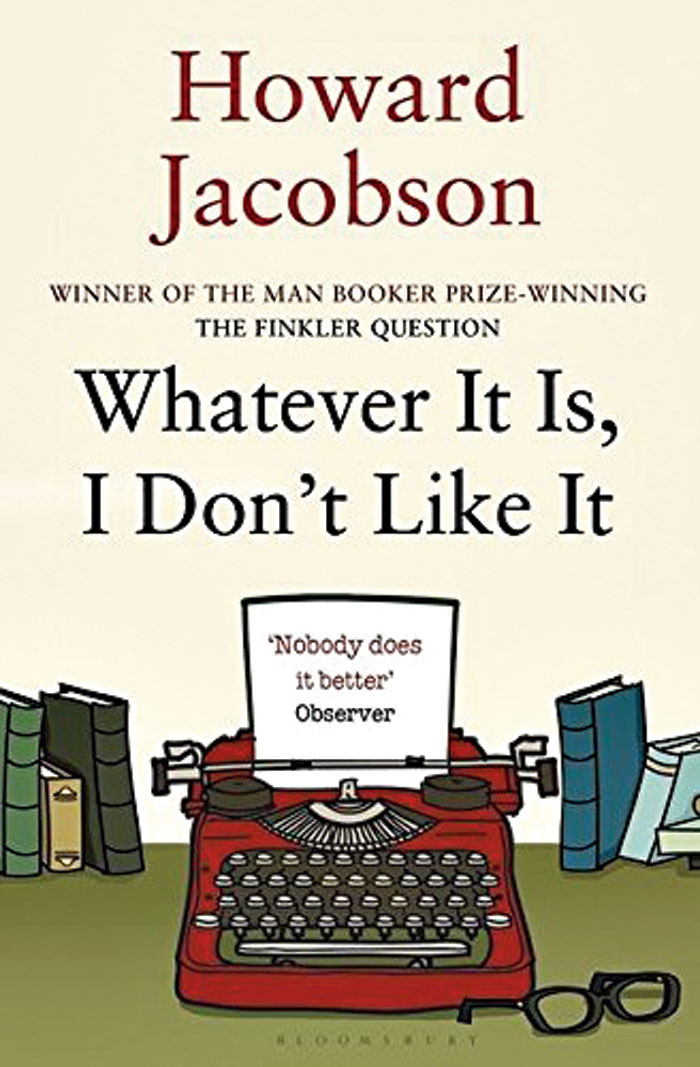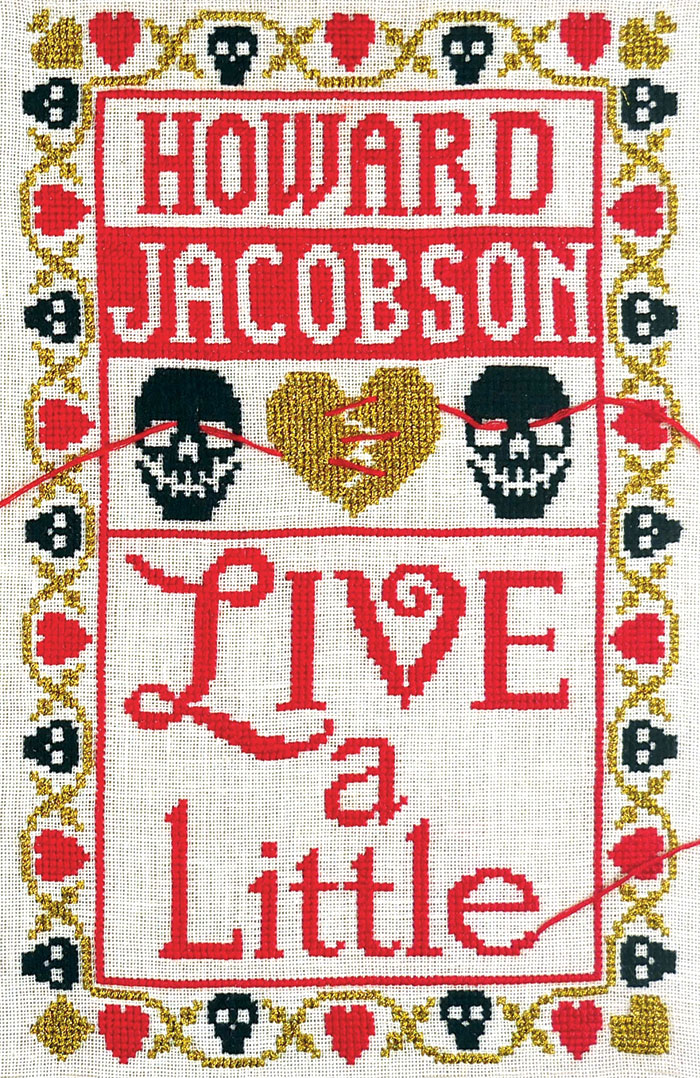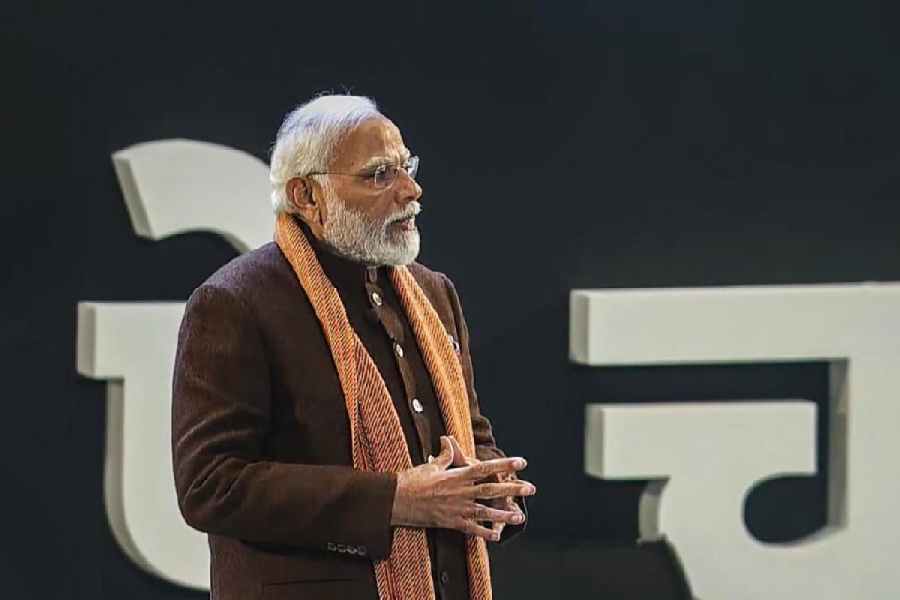“But a childhood experience has taught him that loss is intrinsic to love, and Felix realises that he can only be truly happy if his wife is sleeping with another man.”

Whatever it is, I don't like it Book cover
This singular line on the back cover of a book with a misleading, Mills & Boon-esque cover and a pink spine to boot, was my first introduction to the Booker Prize winner for The Finkler Question — Howard Jacobson. The book was called The Act of Love and the protagonist Felix Quinn, an antiquarian bookseller with a beautiful wife, Marisa, found redemption in cuckoldry not as a fetish but as an extension of his ego. I was hooked and as I sat in front of him at Zee Jaipur Literature Festival 2020 (JLF) gushing about The Act of Love, the 77-year-old author smirked and remarked at the possibility of arranging for a portion of royalty for providing free publicity to his “least appreciated but personally favourite” book. “She was so alive… the most alive character I have ever written, probably because she was so free of me and she stayed free,” he trails off, speaking of Marisa.
Here was an author celebrating a fleeting negative emotion that is almost universally experienced but never spoken of. So it was no surprise that at his second visit to JLF, he spoke about the celebration of shame and self-deprecating humour as the only path to becoming a writer. “It doesn’t have to be hilarious. My novels are hilarious but it needs to be funny at some deep level, like (Fyodor) Dostoevsky for example,” he says. He associates “disturbing” with the Russian genius to describe a way “that you need comedy for”, as we sit in the Jaipur sun.
Contemplative, brooding and with a faraway look in his eyes, the old, white man succumbs to certain condescensions that come with certain privileges. “I wouldn’t read a novel that is not funny or is written by a young person,” the British Jewish author declares with aplomb, adamant not to be swayed from his steadfast views and seldom apologetic for his reasoning. “Comedy, too, is about uncertainty — is it funny or not? It is subjective and divisive whereas tragedy is less challenging and more comforting.” There is a sense of derision in his voice for people who like tragic, “feel bad” novels — “everybody” as he refers to them. “Whereas comedy wakes you, stirs you, disturbs you and doesn’t leave you alone. It is much more questioning and probing,” he adds.
“These are, of course, rough terms I am using but, indeed, the novels that I most like writing and reading are those that move between one thing and another. I am the happiest when I have written a paragraph in which things just move from upset to mirth, in the course of a sentence,” he repudiates himself. His obsession with the dark and macabre is valiantly effortless and he admits to being a man “who loves the smell of blood in a joke”. It is hard to argue for the plight of tragic novels in his mind when he is so successfully cheeky and unabashed in his thoughts, like the naughtiest backbencher.

Jacobson’s latest book, Live A Little, was released last year Book cover
‘Loathe the artist but don’t condemn the art’
His unshakeable faith in the imaginative responsibilities of a novel surpass any possible social responsibility that might be expected from it. “We are dying of social responsibilities and irresponsibilities, but as the same side of the same coin. No, no no! Absolutely not, I hate the idea! So when people complain that a novel is racist, I don’t think that is a proper criticism of the work. The judgemental language that comes from our social concerns like racism or gender inequality don’t apply to novels because “novels are meant to help you take a break from all that”,” he says. He quotes French novelist Louis-Ferdinand Celine and then moves on to call him a “vile, loathsome human being who was imprisoned for fascism. A total anti-semitic piece of filth but... marvellous books”.
Interest piqued, I launch into my tirade of whether or not to disassociate the art from the artist, and he looks at me like a naive child who doesn’t understand the meaning of the word ‘artist’ — slight condescension, slight pity and dollops of flabbergasted humour. I wonder how one deals with these supposedly problematic pieces of art, especially when one is of the firm belief that such complexity and the difficulty of thought only adds to the work. “I wrote a series of articles at the height of the #MeToo movement. Very hard to get them published, when people are saying that you can’t watch a Woody Allen film any more, leave aside whether he is guilty or not,” he says. So vehement is his need to watch Manhattan that the idea of being suggested not to watch it is “absolute nonsense”.
Loathe the artist if you like but don’t condemn the art, he tells me. “Oftentimes, the issues that you have with the man are the ones he is trying to sort out with his work.” He goes back to Manhattan, asserting that Allen was perhaps trying to address his involvement with young women by making a film that is about loving a young woman — one of his highest grossing.
‘I don’t want novels to be socially responsible’
Jacobson is equally dismissive of the impact of his novels on his readers and his responsibility towards them. “It is not my duty to make my readers behave well,” he says to my audacious suggestion that his celebration of all emotions that are socially negative and inappropriate might invite similar behaviour from his readers, thereby increasing the chances of someone getting hurt, emotionally or otherwise. “If they want to have an affair, they will have an affair, it’s not my fault,” he finally laughs. “Will reading Lady Chatterley’s Lover make titled ladies leave their husbands for the gardener?”, and I am compelled to exhaustively smile in complete agreement.
While I am personally disassociating the art from the artist in my head as the conversation plunges on, it takes a tacit turn towards awards and their relevance in an author’s life. “It was very, very useful, winning the Booker Prize, because a large number of readers wouldn’t have otherwise found me.” While praising the impact of awards and the many translations that follow, his definitive views spill over and engulf this thought as well and he is quick to say, “I don’t think awards should be given to adults. Prizes are for children and I was very scornful of all these things for years, but it sure was useful to me.” The Man Booker Prize was conceptualised for a fear that people weren’t reading British fiction any more and were looking towards America. The award not only helped in achieving that but also brought the global limelight on fiction in general, he believes. “When I started writing in the early 1980s, there was a lot of noise around novels because of the Booker Prize. People were really interested in books that were nominated and the ones that weren’t — Anthony Burgess, Salman Rushdie — names of people who were writing ambitious books.”
However, this was followed by a rut phase as well for fiction globally, which has again changed because of social media. “Fiction doesn’t enjoy the respect that it has in the past. I am a 19th century man and I love my George Eliot, Charles Dickens and Jane Austen and those books were read in a particular way that is inconceivable now. Eliot was a prophet of his time; Dickens was a social reformer — don’t expect novels to do that now and I’ve just said that I don’t want novels to be socially responsible.”
His derision for social media continues but he seems rueful. “Nobody is reading novels to discover language in newer ways. Our usual way of language is that of social media — combative. ‘I think this! You think that!’ That’s not the language of novels — scepticism, uncertainty, irony is all missing. People don’t tweet their uncertainties. The more social media controls the daily discourse of our lives, the more we need novels.”
‘There is no literary fiction or popular fiction, just fiction’
I have softened up to the old man by now and comprehend the linear thinking of a person born to be an artist of the macabre. It is this sudden comprehension of his linear thinking that makes me believe that he will perhaps, have a unique opinion on the difference between literary fiction and popular fiction. “I hate the term literary fiction. Hate it! No one walks into a bookstore and says ‘I would like to read some really difficult, ironic literary fiction! But the most popular fiction is ....” he trails off and I am prepared for the worst! “I have no respect for thrillers,” he begins again. “I have respect for people who are writing them. Some of my best friends are, but as a genre, it is despicable, juvenile and just a collection of who did what next.” This is perhaps the only time during the chat that his thoughts don’t quite form coherently because he is overcome with disdain. “There is no literary fiction or popular fiction, just fiction and then there is rubbish.” And then, in his inimitable, cocky, humorous way that borders on ironic self-deprecation, he adds, “I write fiction and they all write rubbish!”
Naming his novels
For a man who doesn’t shy away from the art of exaggeration as long as there is a persistent negative connotation attached to the thought, he refuses to name any of his contemporaries as ‘excellent’. “I am starting to reread Babel, as in the short stories but there isn’t anything that I found amazing in recent times.” A lot has to do with the fact that he is busy trying to figure out his own bearings, with another new novel and a play on the go. He also has a memoir he is working on that will reach us before either the novel or the play, he tells me. He is known to share a special relationship with the process of naming his books but his memoir still remains unnamed. He shares an anecdote about his first novel Coming From Behind, which had remained untitled till it was time to go to press. “Then I heard a commentator at a snooker match on the radio who said ‘He is behind now but he is a pass master who is excellent at coming from behind’ and I immediately had my title. The Act of Love came quite late but I have another favourite novel Kalooki Nights that came to me almost immediately.”
The Scrooge-like old uncle
For a novelist who arouses such contradictory feelings among his readers and oftentimes his hapless interviewers like yours truly, it was only appropriate to end the chat on a mischievous note — talk about his novella Pussy that he wrote on the night of Donald Trump’s ascension to the throne of the President of the United States and was heavily criticised for not ‘packing a punch’, true Jacobson style.
“The title of the book came instantaneously but I feel like I rushed it out. America wouldn’t publish it and I don’t write well, rushed. It’s not my best book and it has its own form, that kind of satire. I could have waited and done it better but I was convinced he wouldn’t last! I wrote it in six weeks and published it in three months and the idea that he’d still be here after three years is astonishing.”
The author behind the first comic novel to have made it to the finishing line of Booker Prize is an enigma who patiently posed for pictures with fans and waxed eloquent about the reading culture in India. Meeting him was akin to that Scrooge-like old uncle who has achieved every middle class dream, but whose views are adamantly steadfast, stemming from an authority that is, perhaps, well-earned. I might rewatch Manhattan tonight...











